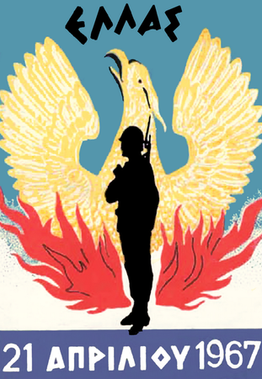
Imagery from the Greek military junta (1967-1974), whose “Golden Dawn” offspring and its ties to the police and military apparatus remains a threat to Greek democracy today. Will Syriza deal with this threat, or will “forgetting” continue?
Lyndon Johnson observed that Greece was “the Vietnam of the 1940s.”
He was referring, of course, to the “civil war” – i.e: the suppression of the Left- that followed the German occupation- the time when the Aegean became an archipelago of torture camps. A
recent study places at c. 100,000 the number who survived or died in
those Anglo-American supported prisons.
After the bitter struggle ended in 1952, the only permissible account of and only account of the Resistance was provided by the winners. Anthropologist Nena Panougia recalls that in 1964 or 1965, when she was a little girl, a man in oldfashioned clothes, “whose seriousness fell on me like a weight,” came to the door and said to her mother “I am selling books, madam.” He looked at me and said again, “’Buy one, please, for your daughter.’” Her mother bought a
four volume set of a history of the Resistance.
“This was by no means the first time that I had encountered a
clandestine procurement of books. When I was even younger, from when
I was four until I was six or seven years old (so, around 1962–65)
my mother would take me with her to downtown Athens, to a basement
apartment that served as a contraband bookshop, beneath the Opera
House…where we would buy copies of Nikos Kazantzakis’s censored
books. Walking to the shop, my mother would hold me by the hand and
make me whisper to her what she had taught me to tell the police if
they stopped us: “We are going to buy underwear” (nearby there was a
shop that made underwear to order). We would buy one book at a time,
as much as my mother’s purse could accommodate, so as not to arouse
suspicion. In this way we managed to get the complete works of Nikos
Kazantzakis. I opened one of those books, The Fratricides, to read
again recently. It is a novel that Kazantzakis wrote about the civil
war in Greece.”
Then in 1967 the junta seized power and the barbed wire went up again.
The colonels and their friends were descended from the fascist
collaborators of a quarter-century earlier, as “golden dawn” is
descended,ideologically and genetically, from the 1967-74 regime of
the colonels.
In 1981, PASOK was elected with a substantial majority. The new
government- the first socialist government in Greece since 1924-
allowed partisans who had taken refuge in Communist countries to
return to Greece, and issued pensions to all those who had fought
in the Resistance against the Germans. The paramilitary national
Gendarmery was abolished. The Greek Central Intelligence; Service
(KYP), was no longer allowed to keep files on citizens and the
existing files were finally incinerated at the steel mill furnace
outside Athens in 1989.
Thus a semblance of reconciliation was achieved through official
amnesia. It had occurred to the Greeks centuries ago that forgetting
(amnesty) may be easier than forgiving, but amnesia is nevertheless
a difficult art. Politicians and pundits might declare the past
gone, but it has weighed like Marx’s incubus upon the memories of
the living. There are “families that have experienced the constant
persecution of the state from the beginning of the Left movement,”
writes Neni Panourgiá… “there are other families that saw three
generations of their members imprisoned simultaneously.”
It’s been forty years since the barbed wire came down and memories
have faded, but “golden dawn” is a powerful jolt to memory. Syriza
appears to be headed for victory, albeit not as impressive as
Pasok’s 1981 mandate. While all eyes should soon be upon the Syriza
government and the bankers, a sizeable part of the population will
experience involuntary tremors and twitches when they recall what
they heard growing up. Syriza must deal deftly with the army and the
cops.











One Response to SYRIZA and Memnosyne